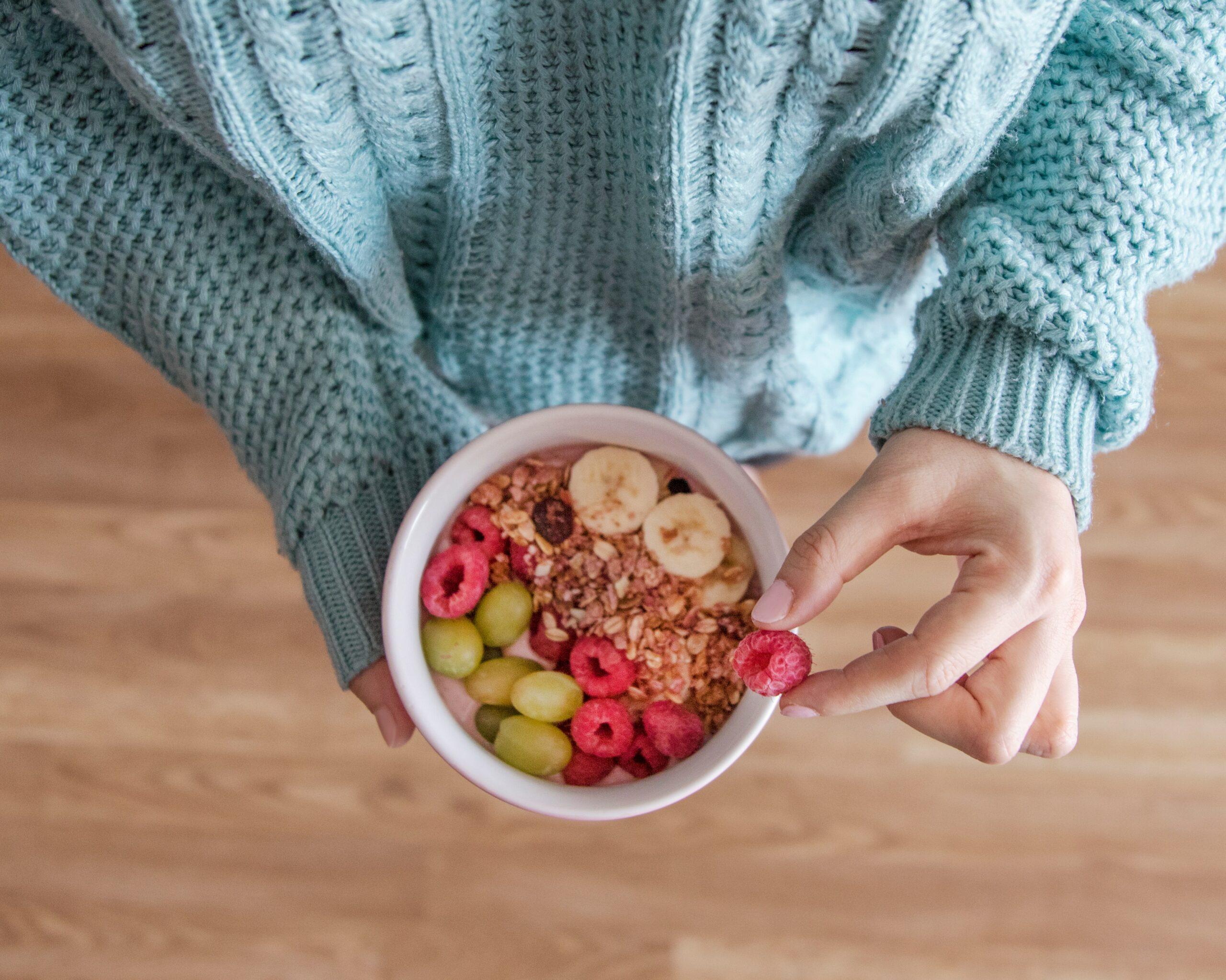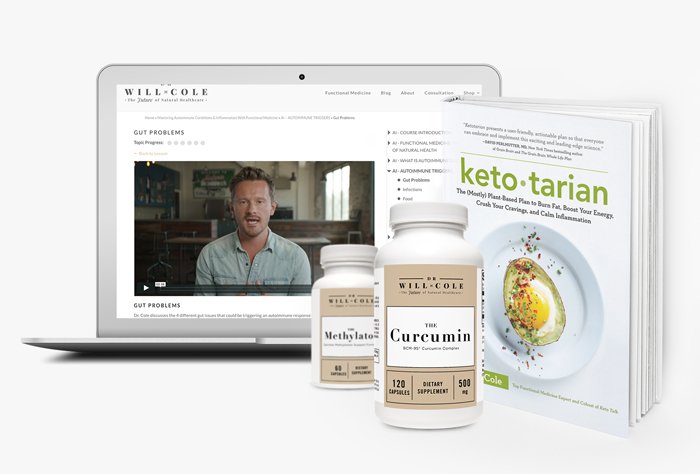Your Go-To Guide For Treating Candida Overgrowth with Functional Medicine

If you pay attention to health trends, you’ve probably been hearing the word “candida” for years, not to mention the many “candida diets” and “candida cleanses” available out here. Sometimes, though, it may seem like “candida” is almost a catchall diagnosis for a wide variety of health problems. Feeling bad? Must be candida! This tends to dilute the perception of what this problem really is and what it can do to your health. Many are now skeptical if candida can actually cause any health problems at all. So, let’s cut through the candida confusion and get the facts.
Article continues below
Make Your Life a Cleanse
SUBSCRIBER-ONLY GUIDES FOR GUT HEALTH, VIBRANT ENERGY, HEALTHY FOOD & CLEAN ALCOHOL
Get FREE access to these + giveaways, recipes, & discount codes in personal emails from Dr. Will Cole.
What Is Candida?
When you hear the word “candida” that is referring to the Candida albicans fungus, which is the most common yeast in the human gastrointestinal system. Ideally it occurs in small amounts and is one part of a healthy microbiome.
However, sometimes conditions are ripe for Candida albicans to grow out of control – often when there is a decrease in beneficial bacteria, such as with a course of antibiotics or due to a poor diet. This allows overgrowths of opportunistic bacteria, parasites, and yeasts like candida, causing dysbiosis, or an unhealthy microbiome. What triggers candida overgrowth? In addition to diet and antibiotics, this overgrowth can be caused by stress, chronic illness, other medications, or a combination of any of these. Note that candida overgrowth can be just one part of a larger gut problem.
Who Is Susceptible To Candida Overgrowth?
Research has found that people with the following problems are more likely to get candida infections and/or be exacerbated by intestinal candidiasis or yeast overgrowth:
- Autoimmune conditions (1)
- Chronic antibiotic use (2)
- Diabetes or metabolic syndrome (3)
- Weakened immune systems (4)
- High levels of estrogen (oral contraceptives or estrogen replacements) (5)
What are Candida Overgrowth Symptoms?
How do you know you have candida overgrowth specifically, or dysbiosis in general? Acute infestations of candida, such as recurring yeast infections, are well documented, but chronic, low-grade candida overgrowths are not as easily detected. However, they do exist and have been shown to be related to an increased permeability of the gut lining or leaky gut syndrome.
Because the microbiome plays a role in virtually every aspect of your health, there are many far-reaching, seemingly unrelated symptoms that could be due at least in part to a chronic candida overgrowth. These can include:
- Acne
- Acid reflux
- Anxiety
- Autoimmune conditions
- Bloating
- Brain fog
- Constipation
- Depression
- Diarrhea
- Eczema
- Fungal Infections of skin or nails
- Irritable bowel syndrome (IBS)
- Low immune system
- Panic attacks
- Thyroid symptoms
- Weight loss resistance
How Do You Test For Candida Overgrowths?
Low-grade overgrowths can be quite subtle, but can be detected with the proper diagnostic testing. I run either a two- or three-day stool collection that analyzes the DNA of the specific pathogens that are in your microbiome and often go undetected on standard labs. Interestingly, instead of finding Candida albicans, I often find abnormal amounts of other types of candida or different fungus species on lab results.
What To Do If You Think You Have Candida Overgrowth
1. Ask your doctor about a comprehensive stool test
Doctors can often detect candida in stool samples. A multiple-day collection provides a more complete look at the microbiome and can uncover fungal, bacterial, or parasitic overgrowth, as well as beneficial bacteria levels. Retesting a few months into care allows for any modification that may be needed. What does candida in stool look like? Stool heavy in candida overgrowth may contain a foam or mucus, usually yellow, white, or light brown. Even if it is not visually obvious however, it can still be an effective detector of an underlying candida problem. A multiple-day collection provides a more complete look at the microbiome and can uncover fungal, bacterial, or parasitic overgrowth, as well as beneficial bacteria levels. Retesting a few months into care allows for any modification that may be needed.
2. Ask about a test for leaky gut syndrome
In order to detect the possibility of leaky gut syndrome, a blood test will assess if anything harmful from the gut is passing into the bloodstream.
3. Rule out SIBO
Small intestinal bacterial overgrowth, or SIBO, is common with candida overgrowth, further complicating treatment. It can be helpful to look for SIBO.
4. Avoid sugar
Candida eats what you eat, and it especially loves sugar! Avoiding junk foods and excess amounts of fruit, juice, and starchy foods like potatoes is essential to get a Candida overgrowth under control.
5. Hold off on fermented foods
Fermented foods like sauerkraut and kimchi are wonderful sources of probiotics, but can also feed candida overgrowth. Certain probiotic supplements that contain prebiotics can also feed overgrowths. These are all healthful foods, but I generally suggest waiting until after the die-off phase of Candida removal before adding these back in to recolonize the microbiome. This can take anywhere from weeks to months, depending on the severity of the case.
6. Take targeted natural medicines
Caprylic acid, (6) oregano oil, (7) garlic, (8) and black tea (9) were all shown in the literature to be effective treatments for candida overgrowths. The beneficial yeast S. boulardii was also shown (10) to be effective against candida overgrowth, decreasing both the inflammation from the overgrowth and the spreading of candida in the gut.
7. Try personalized functional medicine care
Even with natural options, what works for one person may not work for you! Today, lab testing can better inform us which natural medicines would be better for your individual candida overgrowth or gut infection. This ensures targeted and more effective care. Take advantage of our free evaluation via webcam or phone to get your questions answered and to see if functional medicine is right for you.
Putting It All Together
Food is undoubtedly the most important factor you can modify on your own as you begin your gut-healing, Candida-busting journey. For more help, work with a qualified clinician on customized natural protocols for candida cleanse diet. Consider taking advantage of a free webcam or phone evaluation to talk about your individual case. Always talk to a trusted health care provider before making changes to your diet.
As one of the first functional medicine telehealth clinics in the world, we provide webcam health consultations for people around the globe.
Photo: unsplash.com
Read Next: Histamine Intolerance: Causes, Symptoms, and Natural Treatments
Start Your Health Journey Today
FUNCTIONAL MEDICINE CONSULTATIONS FOR PEOPLE AROUND THE WORLD
References:
- Zielinski, C., Mele, F., Aschenbrenner, D. et al. Pathogen-induced human TH17 cells produce IFN-γ or IL-10 and are regulated by IL-1β. Nature 484, 514–518 (2012). https://doi.org/10.1038/nature10957
- Woods JW, Manning IH, Patterson CN. Monilial Infections Complicating The Therapeutic Use of Antibiotics. JAMA. 1951;145(4):207–211. doi:10.1001/jama.1951.02920220015003
- Margaret K Hostetter Handicaps to Host Defense: Effects of Hyperglycemia on C3 and Candida albicans Diabetes Mar 1990, 39 (3) 271-275; DOI: 10.2337/diab.39.3.271
- Giri S, Kindo AJ. A review of Candida species causing blood stream infection. Indian J Med Microbiol. 2012;30(3):270‐278. doi:10.4103/0255-0857.99484
- Spinillo A, Capuzzo E, Nicola S, Baltaro F, Ferrari A, Monaco A. The impact of oral contraception on vulvovaginal candidiasis. Contraception. 1995;51(5):293‐297. doi:10.1016/0010-7824(95)00079-p
- Murzyn A, Krasowska A, Stefanowicz P, Dziadkowiec D, Łukaszewicz M. Capric acid secreted by S. boulardii inhibits C. albicans filamentous growth, adhesion and biofilm formation. PLoS One. 2010;5(8):e12050. Published 2010 Aug 10. doi:10.1371/journal.pone.0012050
- Akgül A, Kivanç M. Inhibitory effects of selected Turkish spices and oregano components on some foodborne fungi. Int J Food Microbiol. 1988;6(3):263‐268. doi:10.1016/0168-1605(88)90019-0
- Jennifer A. Shuford, James M. Steckelberg, Robin Patel Effects of Fresh Garlic Extract on Candida albicans Biofilms Antimicrobial Agents and Chemotherapy Dec 2004, 49 (1) 473; DOI: 10.1128/AAC.49.1.473.2005
- Sitheeque MA, Panagoda GJ, Yau J, Amarakoon AM, Udagama UR, Samaranayake LP. Antifungal activity of black tea polyphenols (catechins and theaflavins) against Candida species. Chemotherapy. 2009;55(3):189‐196. doi:10.1159/000216836
- Jawhara S, Poulain D. Saccharomyces boulardii decreases inflammation and intestinal colonization by Candida albicans in a mouse model of chemically-induced colitis. Med Mycol. 2007;45(8):691‐700. doi:10.1080/13693780701523013
- National Research Council (US) Subcommittee on the Tenth Edition of the Recommended Dietary Allowances. Recommended Dietary Allowances: 10th Edition. Washington (DC): National Academies Press (US); 1989. 7, Fat-Soluble Vitamins. Available from: https://www.ncbi.nlm.nih.gov/books/NBK234920/
- National Research Council (US) Subcommittee on the Tenth Edition of the Recommended Dietary Allowances. Recommended Dietary Allowances: 10th Edition. Washington (DC): National Academies Press (US); 1989. 7, Fat-Soluble Vitamins. Available from: https://www.ncbi.nlm.nih.gov/books/NBK234920/
- Akgül A, Kivanç M. Inhibitory effects of selected Turkish spices and oregano components on some foodborne fungi. Int J Food Microbiol. 1988;6(3):263‐268. doi:10.1016/0168-1605(88)90019-0
- Giriraju A, Yunus GY. Assessment of antimicrobial potential of 10% ginger extract against Streptococcus mutans, Candida albicans, and Enterococcus faecalis: an in vitro study. Indian J Dent Res. 2013;24(4):397‐400. doi:10.4103/0970-9290.118356
- Sitheeque MA, Panagoda GJ, Yau J, Amarakoon AM, Udagama UR, Samaranayake LP. Antifungal activity of black tea polyphenols (catechins and theaflavins) against Candida species. Chemotherapy. 2009;55(3):189‐196. doi:10.1159/000216836
- Sony Kumari, Neelanjana Sarmah, A. K Handique, Antioxidant and Antimicrobial Potential of Ripen and Unripe Juice of Citrus limon International Journal of Pharmaceutical Science Invention Volume 3 Issue 6 June 2014 PP.18-20
- Bode C, Bode JC. Effect of alcohol consumption on the gut. Best Pract Res Clin Gastroenterol. 2003;17(4):575‐592. doi:10.1016/s1521-6918(03)00034-9
- Bill Hendrick, Brewing a Gentler Java WebMD March 22, 2010 https://www.webmd.com/digestive-disorders/news/20100322/brewing-gentler-java#1
- Studer-Rohr I, Dietrich DR, Schlatter J, Schlatter C. The occurrence of ochratoxin A in coffee. Food Chem Toxicol. 1995;33(5):341‐355. doi:10.1016/0278-6915(94)00150-m
- Soliman KM. Incidence, level, and behavior of aflatoxins during coffee bean roasting and decaffeination. J Agric Food Chem. 2002;50(25):7477‐7481. doi:10.1021/jf011338v
- Feldman EJ, Isenberg JI, Grossman MI. Gastric Acid and Gastrin Response to Decaffeinated Coffee and a Peptone Meal. JAMA. 1981;246(3):248–250. doi:10.1001/jama.1981.03320030040027
View More At Our Store
Purchase personally curated supplements
and Dr. Will Cole’s books!

The information on this website has not been evaluated by the Food & Drug Administration or any other medical body. We do not aim to diagnose, treat, cure or prevent any illness or disease. Information is shared for educational purposes only. You must consult your doctor before acting on any content on this website, especially if you are pregnant, nursing, taking medication, or have a medical condition.
Our articles may include products that have been independently chosen and recommended by Dr. Will Cole and our editors. If you purchase something mentioned in this article, we may earn a small commission.

BY DR. WILL COLE
Dr. Will Cole, DNM, IFMCP, DC is a leading functional medicine expert who consults people around the globe, starting one of the first functional medicine telehealth centers in the world. Named one of the top 50 functional and integrative doctors in the nation, Dr. Will Cole provides a functional medicine approach for thyroid issues, autoimmune conditions, hormonal imbalances, digestive disorders, and brain problems. He is also the host of the popular The Art of Being Well podcast and the New York Times bestselling author of Intuitive Fasting, Ketotarian, Gut Feelings, and The Inflammation Spectrum.

Gut Feelings
Healing The Shame-Fueled Relationship
Between What You Eat And How You Feel


